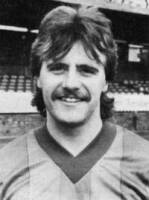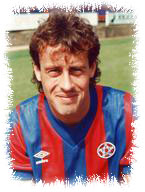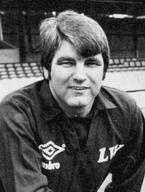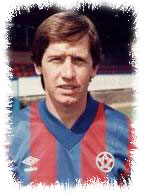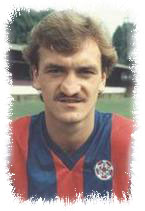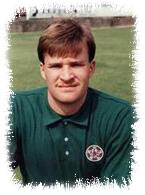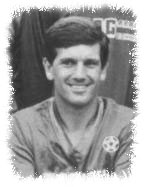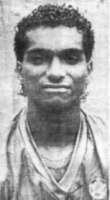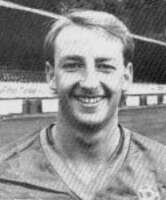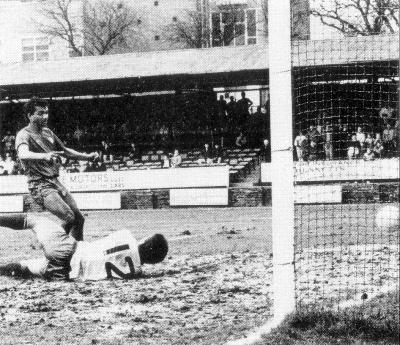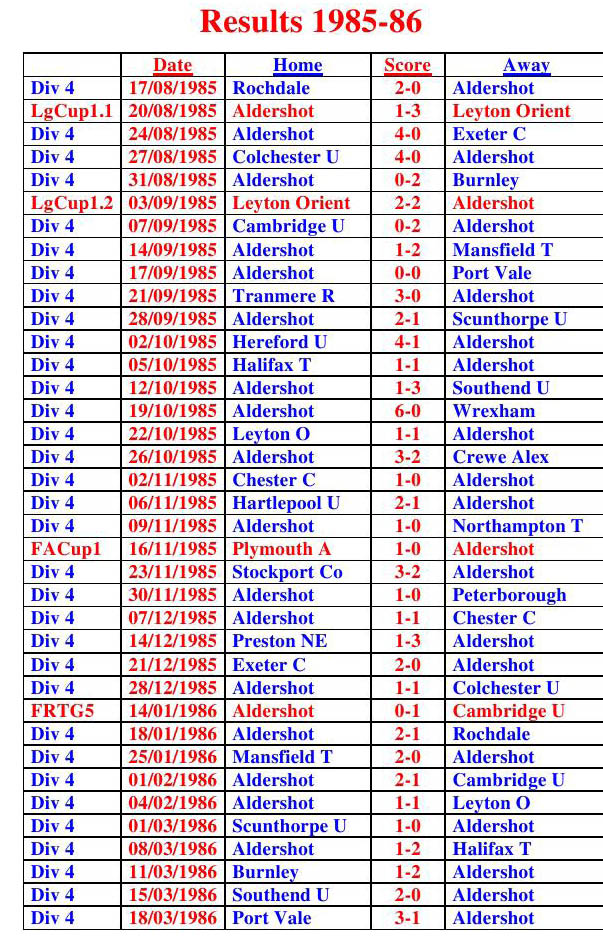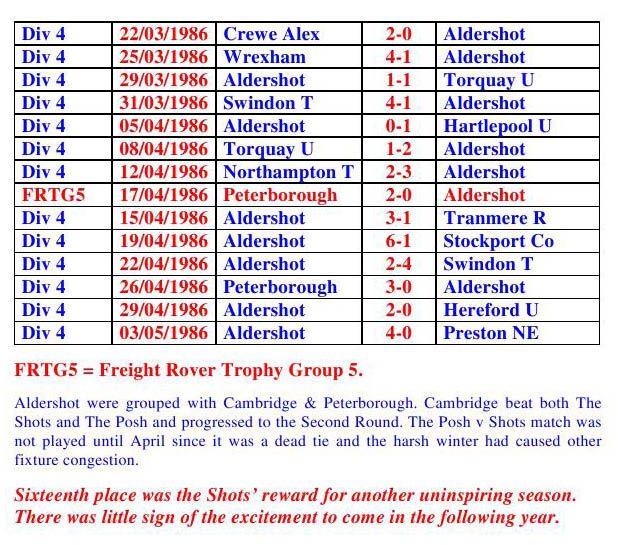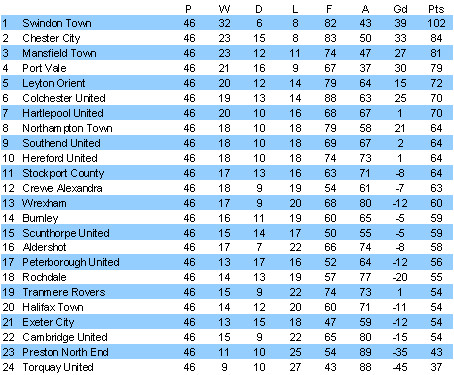Back : Massey, Mazzon, Gillard
Middle : Anderson (Coach), Ferns, McNeil, Cox, Coles, Foyle, Smith, Walker (Manager)
Front : Blankley, Staff, McDonald, Shrubb, Fielder
Inset : Coleman, Duncan, Johnson
At the start of the 1985/6 season Len Walker's Aldershot side were looking to build on a 13th place finish in Division Four. Summer signings were Gary Johnson from South African football, Colin Duncan from Reading and Blackpool's Phil Ferns. Leaving the club were Clive Day (Dagenham) and the retiring Andy McCulloch. The defence suffered a set-back when Phil Coleman broke a leg in a pre-season friendly against Watford and Shots got off to a slow start losing at Rochdale on the opening day and to Orient in the Milk (League) Cup. Keeper Graham Cox was injured in the Orient match so a loan signing was made - Charlton Athletic's Tony Lange. Lange debuted in the first home league fixture against Exeter City, where a brace apiece from Paul Staff and Martin Foyle ensured a convincing 4-0 victory, although the crowd was a disappointing 1,411.
A 4-0 reverse at Colchester United was somewhat unfortunate, three of the goals coming in the closing stages. Following home defeats to Burnley and Mansfield Town, and despite a 2-0 win at Cambridge United, Mark Morris was signed on loan from Wimbledon to bolster the spine of the team. Aldershot had slipped to 19th position when 13th placed Port Vale visited on Tuesday 17th September. This fixture is notable for drawing the record lowest home League attendance to an Aldershot match - just 1,027. The loyal few saw a goalless draw in which Shots were represented by: Tony Lange, Barry Blankley, Paul Shrubb, Andy Massey, Colin Smith, Giorgio Mazzon, Mark Morris, Gary Johnson, Colin Duncan (Paul Staff), Martin Foyle and Ian McDonald.
A 3-0 loss at Tranmere Rovers was followed by Shots' lowest ever League attendance for a Saturday match - 1,056 - when Scunthorpe United visited on 28 September. Both sides were in the bottom five. Two Martin Foyle goals settled the match. This game also saw the return of David Coles in goal with Lange's loan ending. Gary Johnson began to find his way in front of goal, scoring at Hereford and Halifax, though just one point for Shots kept them near the foot of the table. The visit of second placed Southend United saw a reasonable attendance, 1,816, but a 3-1 defeat.
Shots were down to 22nd in the table when they hosted fifth placed Wrexham but amazingly it was a day when everything went right. Johnson scored 4 times, with further goals from Foyle and McDonald. A point at Orient and 3-2 home win over Crewe Alexandra moved Shots towards mid-table. However, an early FA Cup exit, losing to a single goal at Plymouth Argyle meant no financial windfall. Home form was their saving grace as wins over Northampton Town and Peterborough United followed.
The Peterborough match turned out to be Martin Foyle's last of the season, a major loss both for his team play and goals. Mark McNeil partnered Andy Massey in attack in the next three matches, neither of them scoring, though Shots picked up 4 points. As a further blow to finances the home Boxing Day tie with promotion chasing Swindon Town was postponed due to adverse weather conditions.
Two days later Martin Butler, loaned from York City, led the attack against Colchester United. Shots drew 1-1 with Coleman scoring. Barry Blankley, having endured a septic toenail earlier in the season broke a toe during the match. A lengthy hiatus followed with away matches at Torquay and Burnley postponed. Shots first match in 1986 was in the Freight Rover Trophy, they lost 1-0 to Cambridge United before 826 spectators.
During a harsh winter Shots first league fixture of 1986 was home to Rochdale on January 18th. They edged closer to mid-table thanks to a 2-0 win, with goals from a Phil Ferns penalty and loanee Martin Butler. After just two matches in a month Butler was back to York with Colin Fielder moved into a more attacking role and another loan signing - Luton's teenage striker Mark Stein. Stein scored on his Shots debut, Colin Fielder bagging the other goal in a 2-1 home win against Cambridge United, played in front of a low 1,131 crowd. Fielder also scored in a 1-1 home draw with Orient on 4th February. This would be Stein's last game as no further matches could be played until 1st March - three consecutive postponements. This enabled Blankley to return from a broken toe, but Shots embarked on a sorry run of results, collecting just 4 points in 10 games.
Israeli Aharon Fadida finally made his debut, as a substitute, during the 2-1 home loss to Halifax on 8th March. A former Hapoel Haifa player, Fadida had been training with Shots since September but forced to wait for a work permit. A surprise 2-1 win at Burnley kept Shots out the re-election places during their dismal run, with a significant debutant starting in the number 7 shirt at Southend. Twenty-three year old Bobby Barnes had never established himself at West Ham despite 43 league games and 5 goals in six seasons. He'd been loaned to Scunthorpe earlier in the season but Shots secured his signature for £15,000.
Bobby Barnes didn't score in his first seven matches, during which Shots gathered a sad single point home to Torquay. Winter postponements enforced a heavy schedule, 9 League matches in March and 8 in April. Barnes and loanee Paul McMenemy scored in Shots 2-1 win at Torquay on April 8th, prompting a late upsurge. Four consecutive wins were achieved; 3-2 at Northampton (Barnes 2, Johnson) and home wins over Tranmere (3-1 Fadida 2, Johnson) and Stockport (6-1 Barnes 3, Johnson, Fielder, Smith). These were followed by two defeats, including a 4-2 loss at home to runaway leaders Swindon, in front of 3,723 spectators, almost double Shots' next highest attendance of the season.
| Barnes scores his third against Stockport |
Home wins over Hereford and Preston concluded the campaign with Shots in 16th place with 58 points. Encouragingly Barnes had scored 8 goals in the final 8 games, with McMenemy scoring 5 as Shots picked up 18 of their 58 points. Gary Johnson top scored in league matches with 15 goals in 43 games. Martin Foyle scored 9 in 20 before injury and Colin Fielder 8 in 30. Ian McDonald was ever present in the League, Giorgio Mazzon appeared 44 times and won Player of the Season, while Barry Blankley and Paul Shrubb played 38 games.
Attendances averaged a very disappointing 1,480, the lowest average in Shots' history and a huge 26% decrease on the previous season's average (2,010), which had at the time been the second lowest season average. Only two clubs drew lower crowds than Aldershot, but attendances throughout the game were at an all time low. Football had serious problems. The Bradford City fire disaster on 11th May 1985 took the lives of 56 supporters, the Heysel disaster of 29th May 1985 in which 39 fans died led to a five-year ban on English clubs in European competition. Margaret Thatcher's Conservative Government had overseen widespread unemployment and hardship. Their response to high-profile media coverage of hooliganism was to vilify football supporters and propose reactionary measures including compulsory identity cards for spectators. Total Football League attendances were below 16.5 million. The steady upwards trend in football attendances during the last 20 years is demonstrated by last season's aggregate of 29.2 million spectators in the top four divisions (a 77% increase on 1985/6).
Elsewhere at the Mexico World Cup Gary Lineker's golden boot led England to the quarter-final where Maradona's two goals; one punched, the other sublime, ended our hopes. Liverpool pipped Everton to the Division One Championship by two points, West Ham a further two behind. Liverpool completed the double defeating Everton 3-1 in the FA Cup Final. Norwich won Division Two, accompanied by Charlton returning to the top flight after a 29 year absence and Wimbledon climbing the divisions after just nine season's membership. Swindon Town were Division Four champions, with a massive 102 points, Chester, Mansfield and Port Vale took the remaining promotion places. Wolves suffered a third consecutive relegation reaching Division Four for the first time in their history, Swansea joined them having taken a season longer in their descent.
With grateful thanks to Martin Gooday for generously giving his permission to reproduce this series.

